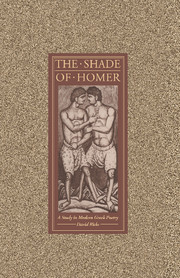Book contents
- Frontmatter
- Contents
- Acknowledgements
- Preface
- Introduction: Homer and the modern Greek poets
- PART ONE HOMER IN THE NEW GREECE: THE SPIRIT AND THE LETTER
- PART TWO SIKELIANOS
- 4 The Homeric inheritance
- 5 Greek romanticism comes of age
- 6 Beyond Homer
- PART THREE CAVAFY
- PART FOUR SEFERIS
- Reflections
- Further reading
- References
- Index
5 - Greek romanticism comes of age
Published online by Cambridge University Press: 04 August 2010
- Frontmatter
- Contents
- Acknowledgements
- Preface
- Introduction: Homer and the modern Greek poets
- PART ONE HOMER IN THE NEW GREECE: THE SPIRIT AND THE LETTER
- PART TWO SIKELIANOS
- 4 The Homeric inheritance
- 5 Greek romanticism comes of age
- 6 Beyond Homer
- PART THREE CAVAFY
- PART FOUR SEFERIS
- Reflections
- Further reading
- References
- Index
Summary
‘When it was a matter of wonder’, Landor wrote, ‘how Keats, who was ignorant of Greek, could have written his ‘Hyperion’, Shelley, whom envy never touched, gave as a reason – “because he was a Greek”.’ This dictum raises a question about the poetry discussed in this book: how, given the fact that modern Greece has acquired Homer from the West, is the modern Greek poet to Helleniʐe the relationship between Homer and himself? Archaism and kleftism were inadequate answers; the local patriotism of Visionary offered the possibility of a new role for Homer; but there was room for a more literary mode of allusion. A particularly self-conscious possibility was to acknowledge the Western contribution to modern Hellenism, as Sikelianos so generously does in ‘Yánnis Keats’ (1915):
A bough Apollo's hand;
a plane-tree's smooth, full bough,
spread above you, may it bring
the ambrosial calm of the universe…
I thought how you would arrive at Pylos' broad, bright shore
in my company,
with Mentor's tall ship gently moored
in the sand's embrace;
how we, bound in the winged friendship of those youths
who fly with the gods,
would go to the stone seats which time
and the folk had made smooth
in order to meet that man who even in the third generation
was governing in peace;
whose discourse of travels and holy judgements matured
in his mind as he grew older… […]
- Type
- Chapter
- Information
- The Shade of HomerA Study in Modern Greek Poetry, pp. 65 - 74Publisher: Cambridge University PressPrint publication year: 1989
- 1
- Cited by

